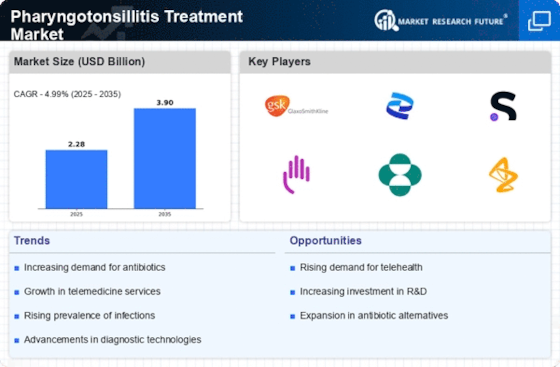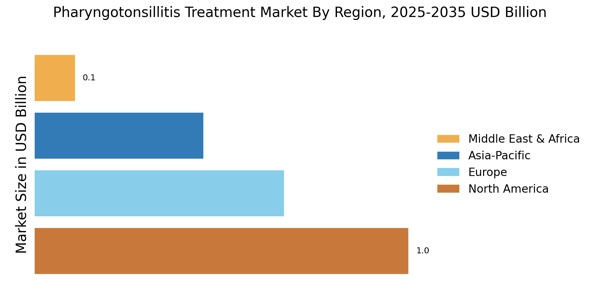Impact of Lifestyle Changes
Shifts in lifestyle and dietary habits are emerging as influential factors in the Pharyngotonsillitis Treatment Market. Increased consumption of processed foods and a decline in overall health awareness may contribute to a higher incidence of pharyngotonsillitis. Additionally, environmental factors such as pollution and exposure to allergens can exacerbate throat conditions, leading to more frequent cases of pharyngotonsillitis. As individuals become more aware of the link between lifestyle choices and health outcomes, there is a growing demand for effective treatments. This awareness may drive patients to seek medical advice and treatment options, thereby expanding the market. Furthermore, public health initiatives aimed at promoting healthier lifestyles could also play a role in shaping the future of the pharyngotonsillitis treatment market.
Rising Demand for Antibiotics
The growing incidence of bacterial infections associated with pharyngotonsillitis has led to an increased demand for antibiotics within the Pharyngotonsillitis Treatment Market. Antibiotics remain a primary treatment option for bacterial pharyngotonsillitis, which is often caused by Streptococcus bacteria. According to recent data, antibiotic prescriptions for pharyngotonsillitis have seen a notable rise, reflecting the need for effective management of the condition. This trend is further supported by the increasing recognition of the importance of timely antibiotic intervention to prevent complications. As healthcare providers continue to emphasize the need for appropriate antibiotic use, the market for pharyngotonsillitis treatments is likely to expand, driven by both the demand for existing antibiotics and the development of new formulations.
Growth of Healthcare Infrastructure
The expansion of healthcare infrastructure is a pivotal driver for the Pharyngotonsillitis Treatment Market. As healthcare facilities become more accessible and equipped with advanced diagnostic tools, the ability to diagnose and treat pharyngotonsillitis has improved significantly. This growth is particularly evident in developing regions, where investments in healthcare are increasing. Enhanced access to healthcare services allows for earlier detection and treatment of pharyngotonsillitis, thereby reducing the burden of the disease. Moreover, the establishment of specialized clinics and outpatient services dedicated to throat-related conditions is likely to further bolster the market. As healthcare systems continue to evolve, the pharyngotonsillitis treatment market is expected to benefit from improved patient access and treatment options.
Advancements in Treatment Modalities
Innovations in treatment modalities are significantly influencing the Pharyngotonsillitis Treatment Market. Recent advancements in pharmacological therapies, including the development of new antibiotics and adjunctive therapies, have enhanced treatment efficacy. Additionally, the introduction of combination therapies that target both bacterial and viral infections is gaining traction. These advancements not only improve patient outcomes but also contribute to a more comprehensive approach to managing pharyngotonsillitis. Furthermore, the integration of personalized medicine, which tailors treatment based on individual patient profiles, is expected to revolutionize the treatment landscape. As these innovations continue to emerge, they are likely to drive growth in the pharyngotonsillitis treatment market, attracting investment and research into new therapeutic options.
Increasing Awareness of Pharyngotonsillitis
The rising awareness regarding pharyngotonsillitis and its symptoms is a crucial driver for the Pharyngotonsillitis Treatment Market. Educational campaigns by health organizations and medical professionals have led to a better understanding of the condition among the general public. This heightened awareness encourages individuals to seek medical attention sooner, thereby increasing the demand for effective treatment options. As a result, healthcare providers are more likely to invest in innovative therapies and medications. Furthermore, the prevalence of pharyngotonsillitis, particularly among children and adolescents, has prompted parents to be more vigilant about symptoms, leading to earlier diagnosis and treatment. This trend is expected to continue, potentially expanding the market for pharyngotonsillitis treatments as more patients are identified and treated promptly.

















